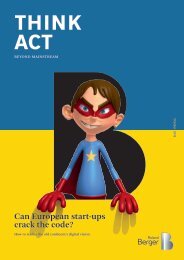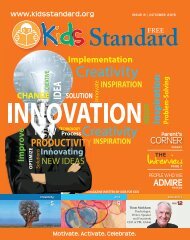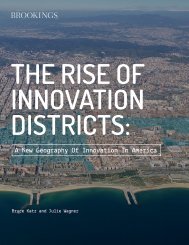TECHNOLOGY AT WORK
1Oclobi
1Oclobi
You also want an ePaper? Increase the reach of your titles
YUMPU automatically turns print PDFs into web optimized ePapers that Google loves.
February 2015<br />
Citi GPS: Global Perspectives & Solutions<br />
7<br />
In addition to providing remarkable<br />
achievements in technology…<br />
…the digital age has also decreased<br />
labour’s share of GDP<br />
The digital age has benefited consumers but<br />
not necessarily workers<br />
1. The Changing Nature of Innovation<br />
The 21st century has already brought remarkable technological<br />
achievements. The leading corporations of the digital age — including<br />
YouTube, Facebook and eBay — barely existed only a decade ago. The<br />
Human Genome Project was completed in 2003, the year Skype was first<br />
released. The first iPhone was launched in 2007 and in 2010 Google<br />
announced their first fully autonomous car. 1<br />
Yet, the benefits of these developments have not been widely shared. Real median<br />
wages have stagnated in about half of all OECD countries since 2000, and have<br />
fallen even further behind growth in productivity. Between 1980 and 2000, each<br />
pound of UK gross domestic product (GDP) growth, for example, was accompanied<br />
by around 90 pence of median wage growth. Over the period 2000 to 2007, the<br />
equivalent number was 43 pence. 2<br />
As a result, many countries have witnessed significant declines in labour’s share of<br />
GDP. According to a 2013 study by Loukas Karabarbounis and Brent Neiman, 42<br />
out of 59 countries experienced a fall in the share of GDP accruing to labour — a<br />
trend that is also found in emerging economies like China. Crucially, about half of<br />
this decline can be explained by the decrease in the relative price of investment<br />
goods, which in turn is driven by advances in computer-driven technologies, leading<br />
companies to substitute labour for capital in production. In the United States the<br />
decline in the labour share has been even more substantial when a small group of<br />
highly skilled workers with soaring income is excluded. 3<br />
Instead of labour, the greatest beneficiaries of the digital age have been<br />
shareholders. According to a recent estimate, the three leading companies of<br />
Silicon Valley employed some 137,000 workers in 2014 with a combined market<br />
capitalisation of $1.09 trillion. 4 By contrast, in 1990 the three largest companies in<br />
Detroit had a market capitalisation of $36 billion while collectively employing about<br />
1.2 million workers.<br />
To be sure, the digital age has brought indisputable gains to consumers, including<br />
the World Wide Web and smartphones, but its impact on the world of work has<br />
arguably been more disruptive than anything seen in the past. Thus, less than 20%<br />
of American workers now believe that the generation currently entering the<br />
workforce will have better lives than themselves. A recent report even predicts that<br />
living standards for many low-to-middle income households in the United Kingdom<br />
are likely to be lower by 2020 than they were in 2008. 5<br />
Substantial wealth is being created with only a few workers, and with the exception<br />
of a small fraction of highly skilled workers, wages may not rise over their lifetime.<br />
Building on a widely discussed paper entitled The Future of Employment: How<br />
Susceptible are Jobs to Computerisation?, by Carl Benedikt Frey and Michael<br />
Osborne, this report examines how the changing nature of innovation, stemming<br />
from the digital revolution, is transforming the world of work and the challenges it<br />
brings.<br />
1 The authors are very grateful to Andrew Pitt and Professor Ian Goldin for guidance in<br />
framing this report, as well as to Kathleen Boyle at Citi and Anushya Devendra the<br />
Oxford Martin School for their advice and editorial support.<br />
2<br />
Pessoa and Van Reenen (2013).<br />
3 Elsby, Hobijn and Sahin (2013).<br />
4 Chui and Manyika (2014).<br />
5 Resolution Foundation (2013).<br />
© 2015 Citigroup










